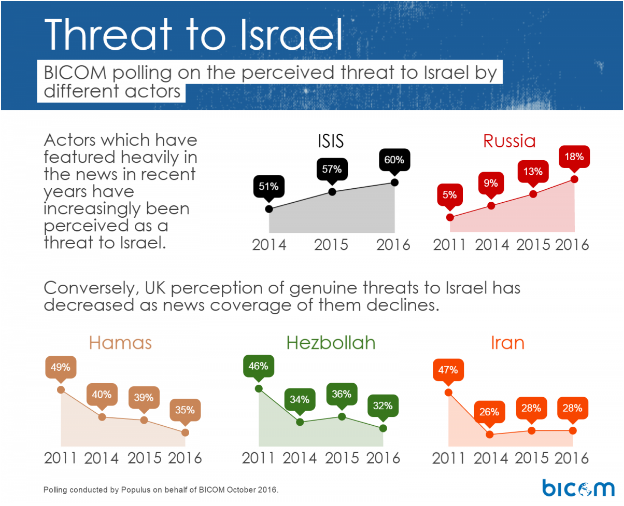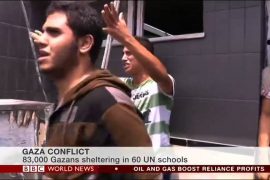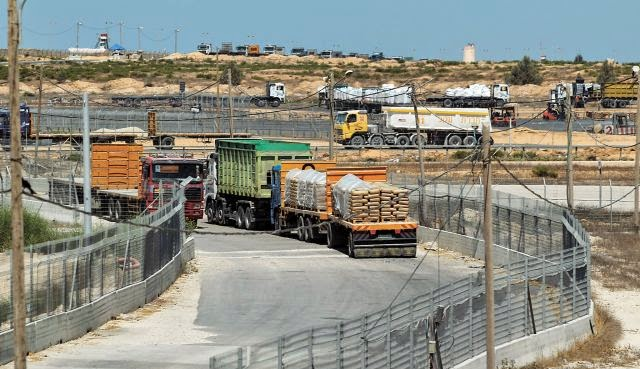BICOM recently published the results of an opinion poll carried out in the UK concerning, among other things, attitudes towards Israel and the BDS campaign. While the results on those topics have grabbed headlines, another section of the poll is no less interesting.
BICOM reports that the poll results indicate that:
“ISIS is seen as the greatest threat to both Britain and Israel. 75 per cent think the terror group is a threat to the UK, while 60 per cent think it is a threat to Israel. Hamas is considered a threat to Britain by 15 per cent of respondents, and Hezbollah by 14 per cent of respondents. This numbers more than doubles to 35 per cent and 32 per cent respectively when respondents are asked if Hamas and Hezbollah are considered to be a threat to Israel.”
The organisation links the findings to media coverage.

A study published by OFCOM in December 2015 shows that:
“The top two news sources, in terms of reach among UK adults, are both TV channels. BBC One is by far the most-used (at 48%), followed by ITV/ ITV Wales/ UTV/ STV News, with just over a quarter (27%) of people saying they use it as a source of news. BBC One has had a five percentage point decrease in reach since 2014 (53%). The BBC website or app remains the third most-used news source: just under a quarter (23%) of people say they use it. The BBC News Channel comes next (at 14%), followed by the Sky News channel (12%) which decreased by five percentage points since 2014. Facebook is now the joint-fifth highest news source in terms of reach, used by 12% of UK adults, an increase of five percentage points since 2014. The most-used radio stations are BBC Radio 4 and BBC Radio 2 (both 8%), while the most-used newspapers are The Sun and the Daily Mail (both 6%).”
Hence, according to the results of BICOM’s poll, what the BBC does not report about Hamas, Hizballah and Iran is as relevant in shaping public opinion in the UK as the stories it does cover.
In the past year – during which, according to the poll, perception of Hamas as a threat to Israel has fallen by 4% – BBC Watch has documented the lack of/inadequacy of BBC coverage on a variety of issues including:
Hamas’ efforts to increase its terror infrastructure in PA controlled areas and inside Israel – see for example “Jerusalem explosives lab not newsworthy for the BBC“, “Hebron news which does not fit into the BBC narrative“, “Hamas terror cash shoes not news for the BBC“.
Missile fire from the Gaza Strip – see for example “Gaza missile attack on Israeli town again ignored by BBC News“.
Hamas’ cross-border tunnels – see for example “BBC News continues to sideline the Hamas tunnels story“, “Tepid BBC reporting on discovery of Hamas cross-border tunnel“, “BBC Gaza bureau’s Abu Alouf hides the Hamas tunnel elephant“.
Hamas’ attempts to smuggle weapons and terror-related materials into the Gaza Strip by sea – see for example “BBC News ignores yet another case of Hamas maritime smuggling” – and by land – see for example “BBC policy of ignoring Gaza smuggling continues“.
Hamas’ co-operation with ISIS in the Sinai Peninsula – see for example “Years of BBC amplifications of Hamas denials unravel“.
Hamas’ indoctrination of children – see for example “BBC silent on British link to incitement of Palestinian children“, “BBC ignores annual terrorist indoctrination of Gaza youth yet again“.
The failure to categorise attacks by Hamas (and others) against Israelis as terrorism – see for example “What word is missing from BBC report on sentencing of Hamas terrorists?“, “The missing word in the BBC’s report on the capture of a Hamas terror cell“.
In that time we have also documented inadequate BBC coverage of Iran’s financing of terrorism – see for example “BBC euphemisms hobble audience understanding of Iranian terror financing“, “BBC News ignores another Iranian funded terror group“, “BBC silent on renewed Iranian funding for PIJ“.
Hizballah efforts to set up terrorist infrastructure in Israel have also been ignored by the BBC – see for example “The news the BBC has to omit in order to keep up its narrative“, “BBC continues to ignore Hizballah terror activity in Israel“.
As is often noted here, the BBC is committed to providing its funding public with news coverage which will enhance their “awareness and understanding of international issues”. Omission of coverage and the under-reporting of certain topics not only compromises that remit but, as BICOM’s poll highlights, hinders the ability of the British public to reach informed opinions.




